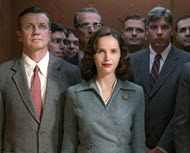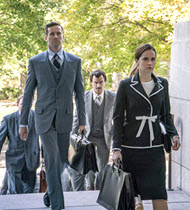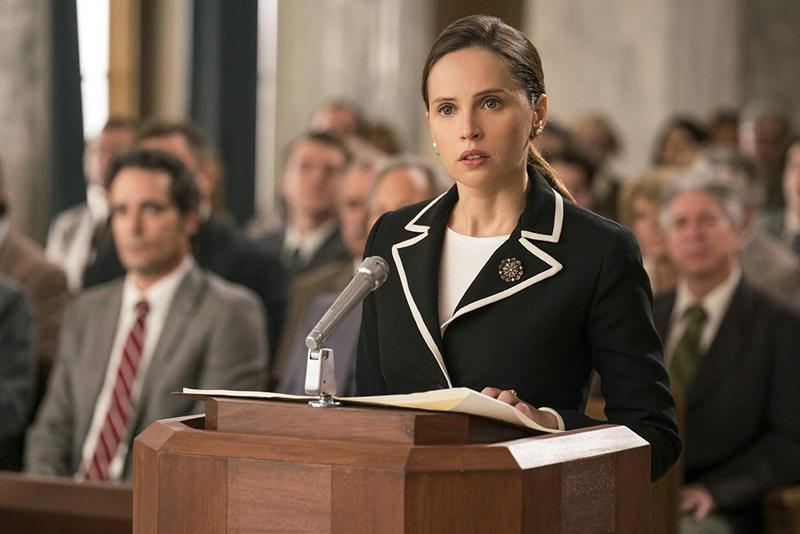On the Basis of Sex
 for some language and suggestive content.
for some language and suggestive content.
Reviewed by: Charity Bishop
CONTRIBUTOR
| Moral Rating: | Average |
| Moviemaking Quality: |
|
| Primary Audience: | Adults Young-Adults |
| Genre: | Political Biography Drama |
| Length: | 2 hr. |
| Year of Release: | 2018 |
| USA Release: |
December 25, 2018 (limited—33 theaters) January 11, 2019 (wide—1,923 theaters) DVD: April 9, 2019 |



Is the Feminist movement the right answer to the mistreatment that some women endure in this sinful world? Answer

Ruth Bader Ginsburg’s repeatedly struck down abortion restrictions. She is “perhaps the nation’s foremost public judicial figure embracing an unqualified constitutional right to human abortion—literally, a right to kill living human embryos and fetuses, right up to the point of birth.”
“Passover, Abortion, and Rabbi Ruth Bader Ginsburg” (off-site article)


“The Beatification of Ruth Bader Ginsburg” (off-site article)
“Why We Should Worry About the Cult of RBG” (off-site article)
List of Ginsburg’s views (off-site)

- Ruth Bader Ginsburg’s career began at Harvard University and Columbia Law School.
- She was an ACLU lawyer and was appointed to the Supreme Court by President Bill Clinton, taking the oath of office in 1993.
- She is currently the Supreme Court’s most liberal judge and much loved by Progressive Liberals for consistently opposing conservative viewpoints. For the period of 1937-2006, her votes rank her as the 2nd most liberal Supreme Court judge.
- In 2012, she advised Egyptians not to use the U.S. Constitution as a model, but rather the Leftist Progressive South African constitution.
- She is 85 years old and currently the oldest Supreme Court justice.



| Featuring |
|---|
|
Felicity Jones … Ruth Bader Ginsburg Armie Hammer … Martin Ginsburg Justin Theroux … Mel Wulf Sam Waterston … Erwin Griswold Kathy Bates … Dorothy Kenyon Cailee Spaeny … Jane Ginsburg Jack Reynor … Jim Bozarth Stephen Root … Professor Brown See all » |
| Director |
| Mimi Leder — “Deep Impact” (1998) |
| Producer |
|
Amblin Partners Participant Media See all » |
| Distributor |
A fan film dramatizing Ruth Bader Ginsburg’s origin story
Sometimes, the laws need to change to reflect the times. That’s the belief Ruth Bader Ginsburg (Felicity Jones) forms in her first year at Harvard. One of only seven women admitted to the prestigious legal institution, after the Dean humiliates the female students at a dinner by demanding to know why they attend Harvard (instead of allowing men to take their place), she becomes even more determined to prove herself. A wife, mother, “bad” cook, and law student, Ruth impresses all her professors with her quick wit and tenacity.
But when her husband, Martin (Armie Hammer), falls ill with cancer, her life changes forever. While he endures surgeries, radiation therapy, and the long road to recovery, she attends his classes for him, reads him his notes, and types up his papers—all while maintaining a high grade average herself. Ruth champions his future career and pursues her own, but enters a professorship when she realizes no law firm will hire a female attorney.
Years later, still battling for equality of the sexes, she discovers a case of male discrimination—a plaintiff denied tax breaks despite being the primary caregiver to his aged mother.
Ruth sees this as a way to crack into laws that discriminate ‘on the basis of sex’—and sets out, against all odds, to change the American legal system forever.
I don’t know how to approach reviewing this film without touching on some things people might assume about it or find offensive because of their personal, political, or religious beliefs. One suggestion is, it’s a propaganda piece intended to humanize and increase fondness for one of the most polarizing Supreme Court Justices in recent history. It also makes anyone arguing against her into sexists (whether they were, I do not know). Then there’s gender equality. She believes and fights for equality “beneath the law,” and denies there is any “difference” between the sexes.
A judge points out she’s wrong, since “men can grow beards, and women can lactate.” It’s a funny moment, but Christians believe men and women are different and have different roles to fulfill (the Creation story in Genesis; the script paints these views as outdated and sexist). Since this film focuses on civil rights, however, her insistence on gender equality beneath the law isn’t misplaced. She is right—we can admit to differences between the sexes, but the law should treat them as equals.
Despite what you may think of Judge Ginsburg and her policies, her tireless work advocating for gender equality set precedents for equal tax benefits and privileges under the law that both sexes benefit from today. This film only follows the first case. What struck me the most was how much “times have changed.” It’s inarguable that Ginsburg caused that change. A hundred years ago, she could not have stood up and addressed this court; now, female law students can attend universities based on their grade average, without being interrogated as to “why” men should give up their spot for them. Being exposed, through this film, to some sexist attitudes in the 1960s and 1970s shows us how much our social beliefs have shifted into equality.
The film celebrates her as a strong, hardworking woman who devoted her life to the cause of equality. It paints her as a loving wife and mother, who puts as much effort into furthering her husband’s career and supporting him as in pursuing her own goals. Ginsburg challenges her children to help them learn to question everything and make smart decisions.
She’s a likable heroine, but not without her mistakes, fumbles, and flaws. Overall, it’s a solid movie, but not the best biographical work I’ve ever seen. About thirty minutes goes into establishing her as a working mother and law student, then it transitions many years later to her successful career as a professor. The legal arguments can be dry, but there are many powerful moments.
The rating comes from the salty language—including one f-word and a dozen s-words. We also hear crude names for parts of the anatomy (d**k and pr**k). Ginsburg changes her brief into “gender” discrimination because her secretary points out that so many uses of the word “sex” in one document sounds tawdry. Characters misuse God’s name twice, and Jesus’ once.
The Ginsburgs are a loving couple; we see them undressing one another and falling onto a bed (Ruth in her slip). Men catcall women, one of whom tells them off (“Would you kiss your mother with that mouth?”). The girls wear short skirts. There’s smoking and drinking.
Though the film avoids the more controversial elements of Ginsburg’s later years, it shows a world struggling to embrace something Jesus knew all along–men and women are equal in His eyes in being worthy of love and forgiveness. He did not discriminate. He spoke to the Jews the same as the Romans, he welcomed children into His presence as often as scholars, He even said of Mary that she chose a better way to spend her time (listening to Him) than her sister, Martha (who was in the kitchen, making lunch). Both genders deserve equal value, in our respect… and under the law.
- Violence: None
- Profane language: Moderately Heavy
- Vulgar/Crude language: Heavy
- Nudity: None
- Sex: Minor
- Occult: None
See list of Relevant Issues—questions-and-answers.


PLEASE share your observations and insights to be posted here.

